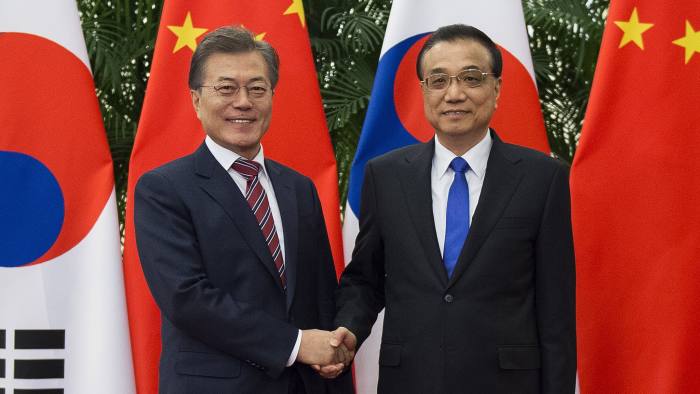By Bryan Harris and Kang Buseong in Seoul and Charles Clover in Beijing

The ephemeral friends: South Korean President Moon Jae-in meeting Li Keqiang in Beijing last week
China has once again banned tour groups from visiting South Korea, signalling that a brief period of detente between the two nations is already coming to an end.
The development underscores the geopolitical complexities of north-east Asia, a region increasingly overshadowed by the threat of a conflict between the US and North Korea over Pyongyang’s development of strategic nuclear weapons.
The ban on tour groups by China, confirmed by two South Korean tourism groups, comes less than two months after Beijing agreed to cease harsh economic retaliation against South Korean companies and organisations over Seoul’s decision to a host a US-operated missile shield.
It also comes less than a week after Moon Jae-in, South Korea’s president, went to China on a state visit that was hailed by officials as heralding a “new era” in ties between the two Asian neighbours. However, the visit was marred by a series of unfortunate incidents, including the hospitalisation of a South Korean journalist who was kicked in the head by a Chinese security guard at one of the official events.
Mr Moon and Xi Jinping also failed to make a joint statement, a clear indication of the lingering tensions between the two nations over Seoul’s decision to install the Terminal High Altitude Area Defence platform, better known as Thaad.
After its deployment earlier this year, China launched stinging economic retaliation against South Korean interests, including a ban on tour groups that officials in Seoul calculated cost the tourism industry about $7bn.
In October, the two countries agreed to bury the hatchet after South Korea offered assurances that it would not enter a full military alliance with Japan and the US nor deploy another US missile battery to defend against North Korea.
China fears the installation’s powerful radar may be used to monitor its own military activities. However, since the agreement China has renewed complaints about the shield and on Tuesday revived the ban on organised groups vacationing in South Korea.
“From yesterday, the Chinese tourism organisation has rejected agencies’ tour group applications, meaning the Chinese government is refusing approval for group tours for no reason whatsoever,” said Jang Yoo-jae, head of the Korea Culture and Tourism organisation, which is comprised of inbound tourism agencies.
Another group representing travel agents added that the Chinese authorities had also rejected its applications.
Shares in South Korean tourism companies and makers of cosmetics, which are popular with Chinese shoppers, fell on Wednesday when reports of the Chinese ban first emerged.
The development comes just four days after Mr Moon left Beijing.
Since then, relations have quickly turned sour.
On Monday, five Chinese military aircraft, including two bombers, entered South Korea’s air defence identification zone, prompting Seoul to scramble fighters.
Two days later, the South Korean coast guard fired more than 200 rounds at dozens of Chinese fishing boats that had violated Seoul’s exclusive economic zone.
The two nations share deep historical and commercial ties as well a common interest in preventing a US war with North Korea, which could threaten the entire region.
However, China is wary of South Korea’s close military ties with Washington as well as the presence of the almost 30,000 American troops on the peninsula.
Japan and South Korea are Washington’s key allies in north-east Asia.
Aucun commentaire:
Enregistrer un commentaire